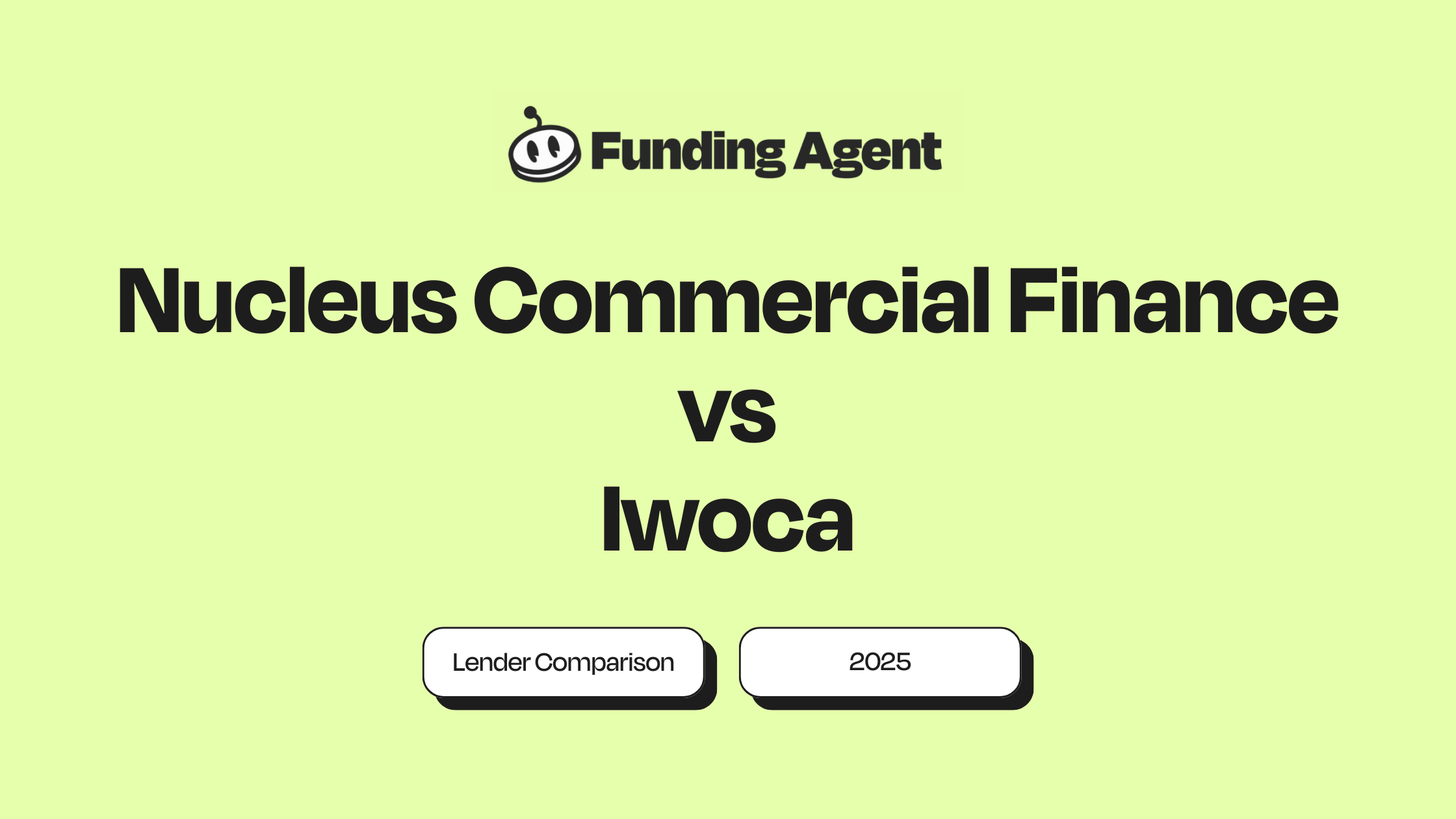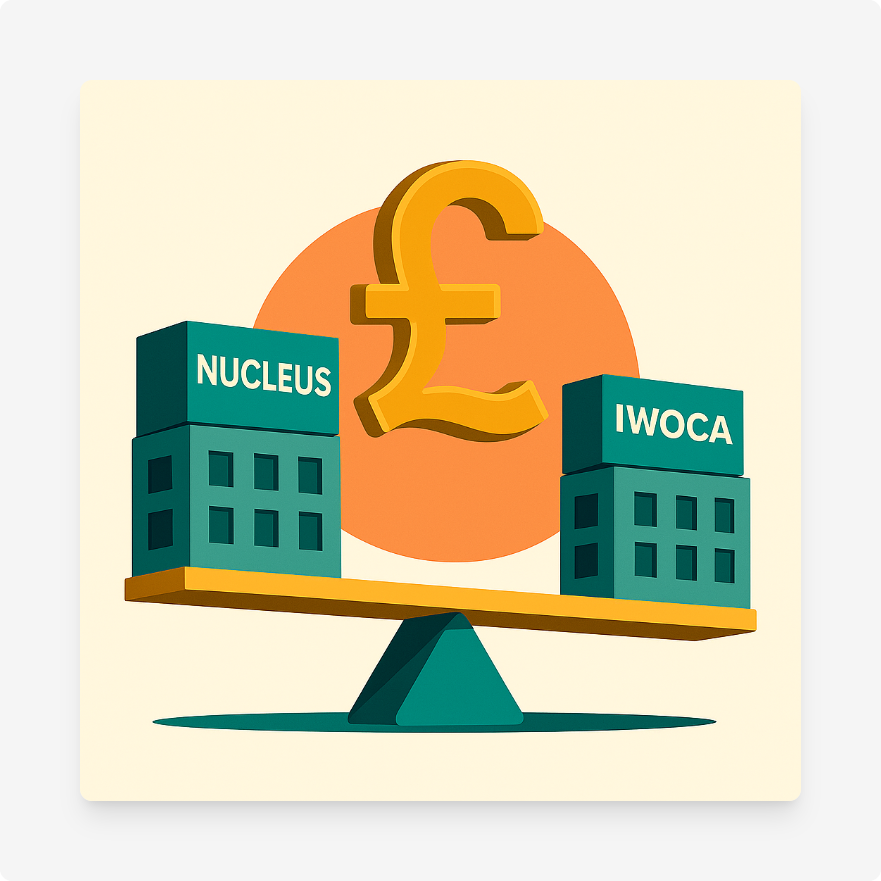

Nucleus Commercial Finance vs Iwoca: Which Lender Is Right for Your UK Business?

In 2025, UK SMEs are navigating a changing finance landscape. Traditional banks still matter, but many business owners find themselves facing delays, stricter credit rules, and paperwork that slows everything down. At the same time, alternative lenders are growing fast, deploying digital tools to bring speed and flexibility to funding. The demand for smarter, faster capital has pushed the market to innovate, and that is where two names keep coming up: Nucleus Commercial Finance and Iwoca.
On paper, both cater to small and medium businesses, both try to offer speed through tech, and both promise a better experience than many banks. Yet their approaches are quite distinct. Nucleus brings a broad set of tools including secured property loans, asset finance, invoice finance, and revenue-linked repayment options. Iwoca offers a simpler path: an unsecured, flexible credit line that you can draw from, paying interest only on what you use.
If you run a business and you are weighing your funding options, this guide will help. You will learn how each lender’s products work, what their real costs tend to be, how fast they operate, who qualifies, and which one may be a better fit for your business needs.

Products and Terms at a Glance
Nucleus Commercial Finance overview, sizes, fees, repayments, terms, eligibility
Nucleus offers a broad set of funding options for UK SMEs. If you want to model fixed-term borrowing, start with our business loan calculator. Nucleus provides unsecured business loans with fixed instalments, property-secured term loans for larger or longer needs, a merchant cash advance style revenue-based loan that flexes with card sales, plus invoice finance and asset finance.
Typical ranges and terms: Unsecured loans from five to six figures with terms from a few months up to several years. Property-backed term loans can extend to around seven years for bigger projects. Revenue-linked advances generally suit £3,000 to £300,000 with repayments tied to takings. Repayments are usually weekly or monthly on fixed schedules for term loans, and variable for revenue-linked products.
Fees and pricing: Arrangement fees are common on term loans. Pricing is usually annualised. Early settlement is typically allowed, which can reduce total interest if you repay ahead of schedule.
Eligibility: UK businesses across many sectors can apply. Requirements vary by product. Secured lending needs suitable collateral. Revenue-linked advances work best for card-taking businesses with regular transactions.
Pros of Nucleus Commercial Finance
- Wide product mix, including secured and sector-specific options.
- Potentially longer terms and larger loan sizes than a pure unsecured line.
- Revenue-linked repayments can match seasonal or card-heavy trading.
- Early settlement typically available on term loans.
Cons of Nucleus Commercial Finance
- Arrangement fees on many term loans.
- More documentation for larger or secured facilities.
- Property valuations and legal steps can add time for secured deals.
Iwoca overview, sizes, fees, repayments, terms, eligibility
Iwoca specialises in fast, flexible unsecured working capital. It behaves like a line of credit: draw the amount you need, pay interest on the outstanding balance, and repay early without fees. Headline ranges and typical timelines are outlined on the Iwoca business loan page.
Typical ranges and terms: Limits from the low thousands up to seven figures for well-qualified firms. Terms up to 60 months. Many customers use it for short to medium working capital and repay early once cash inflows land.
Fees and pricing: Interest is quoted monthly on the used balance. For longer schedules, Iwoca may apply a one-off funding fee that is spread across repayments; details are set out in its pricing guide. Early repayment is free and reduces interest cost.
Eligibility: UK SMEs across many sectors can apply. A director’s personal guarantee is typical for limited companies. Newer businesses can be considered, with limits aligned to turnover and growth, as described in Iwoca’s eligibility FAQ.
Pros of Iwoca
- Quick digital application and rapid access to funds.
- Pay for what you use, with free early repayment.
- Limits can grow over time with positive repayment behaviour.
- Clear, usage-based pricing model suited to short holds.
Cons of Iwoca
- Monthly interest can translate to a higher APR if you keep funds for a long period.
- Personal guarantee is typical for limited companies.
- No property-secured or asset-finance product on the core loan.
Nucleus vs Iwoca, visual comparison
Costs and Repayments in Practice
Look beyond the headline rate. A fixed term loan from Nucleus uses an annualised rate and fixed instalments, often with an arrangement fee. A flexible Iwoca facility charges monthly interest on the balance you use, with a possible funding fee on longer terms as explained in its pricing guide. For market context on comparing products and total costs, consult the British Business Bank and UK Finance. Customer-experience signals from platforms such as Trustpilot can be helpful, but they do not replace clear pricing and terms.
Worked example, Nucleus fixed term
Assumptions: £75,000 unsecured loan over 24 months at an illustrative 12.9 percent per year. Arrangement fee 3 percent (£2,250). Equal monthly instalments.
Indicative outcome: Monthly repayment about £3,560. Total interest roughly £9,440, plus £2,250 fee, for an indicative total near £86,690. If you settle six months early, you reduce interest and lower the total repay. Confirm your actual quote and fee on Nucleus product pages and documents.
Worked example, Iwoca flexible credit
Assumptions: £30,000 drawn for three months within a 12-month facility. Illustrative monthly interest 1.8 percent. No funding fee on a 12-month schedule. Early repayment free.
Indicative outcome: Holding £30,000 for three months at 1.8 percent monthly leads to about £1,620 in interest. Repay in month three, and interest stops. If instead you kept funds for 12 months, the cost increases with time. See Iwoca’s pricing guide for how monthly rates map to total cost and representative APR.
These are illustrative only. Real offers vary by profile, trading history, sector, product, and term.
Speed and Service
Both lenders are built for fast decisions and funding. Iwoca emphasises a short online application, open-banking connections, and decisions in about a working day for many cases, with drawdowns initiated in your dashboard after approval (see its loan page and pricing guide for journey details). Nucleus highlights rapid decisions for unsecured loans and clear steps for secured facilities; property deals take longer due to valuations and legal checks documented on its term-loan pages. Independent market overviews from the British Business Bank and UK Finance also point to faster digital underwriting across alternative lending.
Who Each Lender Suits
Scenario 1, why Nucleus often fits
You need £200,000 to refurbish premises and want predictable instalments over five to seven years. You have collateral and accept more documentation to secure a keener price. Nucleus combines larger loans, longer terms, and asset-backed or property structures that can suit capital projects.
Scenario 2, why Iwoca often fits
You need £25,000 for seasonal stock and plan to repay within three months. Iwoca’s flexible working capital facility lets you draw what you need, repay early at no cost, and pay interest only while funds are outstanding.
How to Apply
Nucleus steps and requirements
Apply online with company details, funding purpose, and recent trading information. Unsecured loans use streamlined checks and e-signing. Property-backed loans add valuation, title checks, and legal documents as set out on Nucleus term-loan pages. Revenue-linked advances require regular card transactions and settlement data.
Iwoca steps and requirements
Complete a short digital form and connect bank or accounting data for quick assessment. Many decisions arrive in about 24 hours. After approval, you draw funds in your account and repay early without fees. For limited companies, a director’s personal guarantee is typical per Iwoca FAQs.
Final Verdict, Which Lender Fits Your Business Best

Choose Nucleus Commercial Finance if…
- You want larger loan sizes or longer terms with fixed instalments.
- You need property-secured or asset-backed structures.
- Your trading is seasonal or card-heavy and could benefit from a revenue-linked advance.
- You prefer predictable repayments for budgeting.
Choose Iwoca if…
- You want fast working capital with flexible drawdowns.
- You plan to repay early to minimise interest.
- You prefer a digital journey with simple top-ups as limits grow.
- You do not need property-secured or asset-finance features.
Both can fit UK SMEs well. The right choice depends on amount, term, and how repayments align with your cash cycle. If you want a neutral view matched to your numbers, compare options with Funding Agent.
Sources
- Nucleus Commercial Finance - Business Loans
- Nucleus Commercial Finance - Revenue-Based Loans
- Nucleus Commercial Finance - Secured Term Loans
- Nucleus Commercial Finance - Unsecured Loans FAQ
- Nucleus Commercial Finance - Property Finance FAQs
- Iwoca - Business Loan Page
- Iwoca - Pricing Guide
- Iwoca - Eligibility and How It Works
- Iwoca - General FAQ
- British Business Bank
- UK Finance
- Trustpilot UK
.png)

